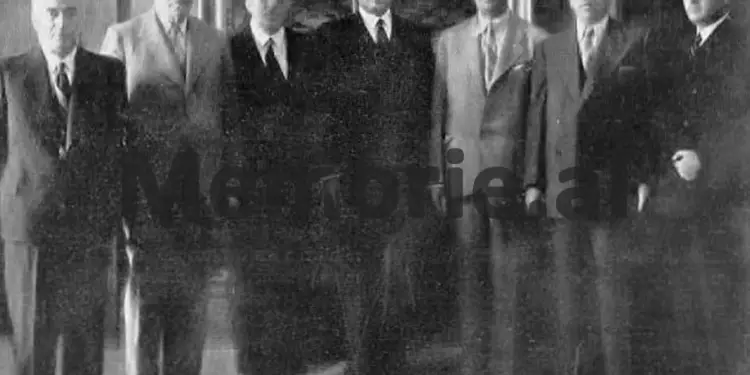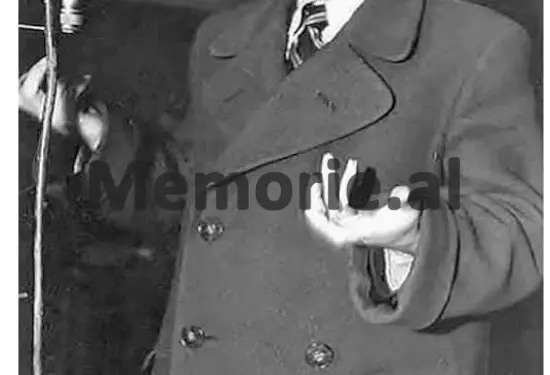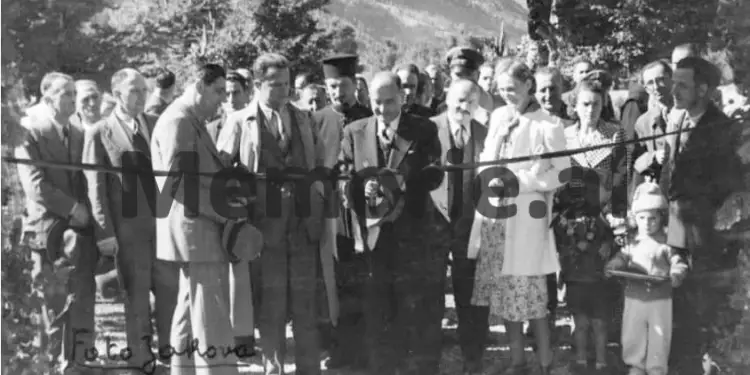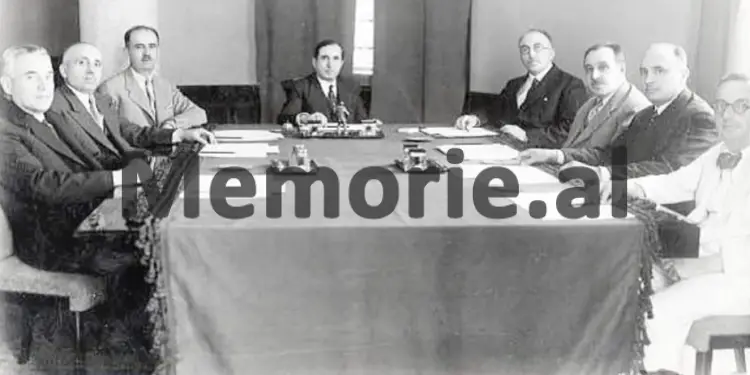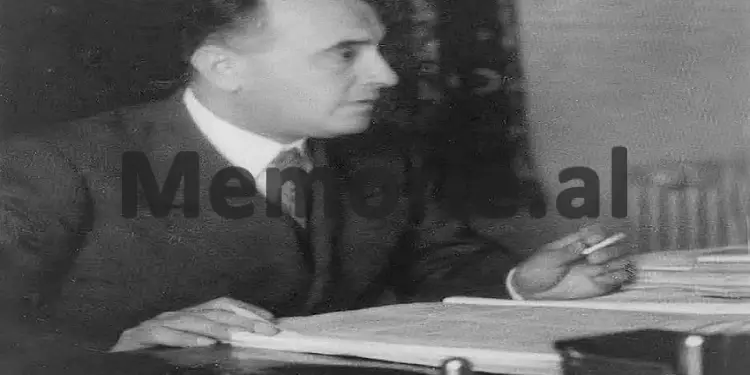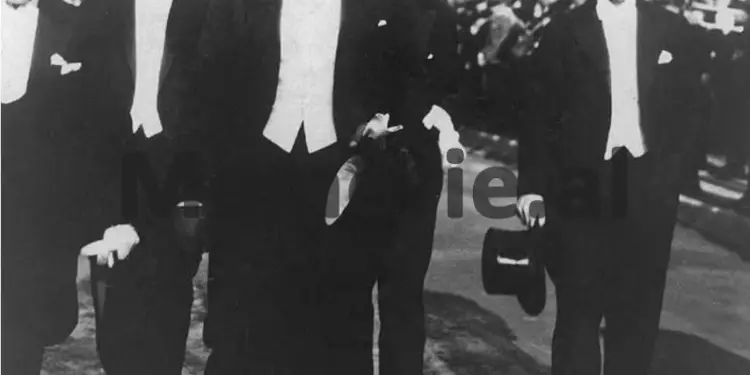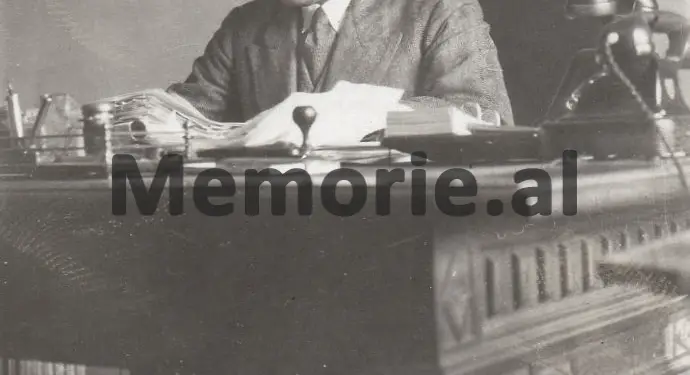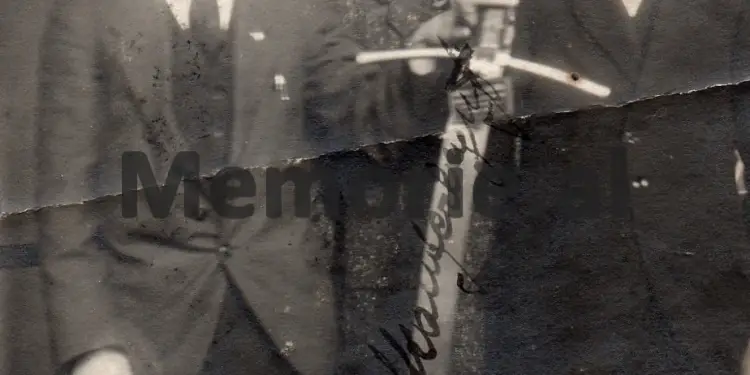Prof. Dr. Luan Malltezi
Review of the book “Rrok Gera, a statesman, as it should be”, monograph by Arben Pustina
Memorie.al / We Albanians have been educated from childhood with love for our beautiful country; we all remember the poems of Naim and other prominent revivalists dedicated to the “motherland” and the beautiful Albanian language. It seems that this love makes us feel good when we read the lives of our people who have worked with dedication for Albania. One of these was Rrok Gera, Minister of Finance and Minister of National Economy in the 30s-40s of the Albanian state. The talented researcher Arben Pustina talks about this personality of the Albanian world with his monographic work “Rrok Gera. A statesman, as it should be”, Tirana 2022. The author deserves to be congratulated for his tedious research work in the numerous funds of the Central State Archive to give the Albanian reader the relevant facts and documents of this outstanding personality of Albanian finances. The author brings evidence from numerous sources of the time that highlight the ability and honesty of Rrok Gera, as a civil servant and minister of state. The author is serious, he presents facts and documents of Gera’s activity as a minister. The author brings articles about Gera as a minister, the draft laws he presents for approval in parliament, photos of the fascist occupation of Albania, newspaper articles about the events of the war in Albania. The work appeals to and has value for public opinion that is tired of today’s corruption at high state levels.
The author is from Shkodër, and this prompts him to point out many events in the history of his city “with pride”: “The development of education in Shkodër – he writes – started about four hundred years ago. Father Donat Kurti talks about Albanian schools that existed in Pllana, Blinisht and Shkodër since 1638. In Obot of Shkodra there was a printing press since around 1500, that is, a few years after it was invented by Guttenberg… Shkodra, with its intellectual elite, published magazines of a high cultural level; in Shkodër, such thin arias of the divine love of the past generations were created”.
Geraj are mentioned in Shkodër from the end of the century. XVIII; according to the author, they were originally from the highlands, this area “with exceptional values and virtues in the formation of the nation”. In this city with an ancient history, Rrok Gera was born on August 15, 1901, the “son of Zefi and Luçija”, the daughter of Cuk Kolë Vaša, from the family of Pashko Vasa. The Gerajs were economically trapped, they had a cigarette factory and land in the Shkodra area. Zef Gera had a workshop in the “Serreq” neighborhood for the manufacture of national clothing. Zef Gera had four sons; these worked in important offices of the Albanian state; the eldest son, Tef Gera, was a deputy in 1925, the other son, Lac Gera, was a controller of the Treasury, in the Ministry of Finance; decorated during the time of the Monarchy with the title: “Commands of the Order of Skanderbeg” Rrok Gera studied in Austria; first the Commercial Academy in Linz and then he continued his higher studies in Economics in Vienna with a scholarship given in 1924 by the Minister of Education, Luigj Gurakuqi. Rroku met Albanian students in Austria, such as: Frederik Shiroka, Skënder Luarasi, Aleks Buda, etc.
Young Albanians in Austria proudly visited the weapons of our National Hero, Gjergj Kastrioti Skënderbeu, which were kept in the Weapons Museum in Vienna. The author gives the reader a picture of Gera with Skanderbeg’s sword in his hands…! Rroku stood out as a student in Vienna, as a member of the “Albania” Association; he published two articles with an economic character, in the magazine “Djalëria”: “Mercantilism and balance of trade and payments” and “Paper money”. On July 12, 1928, Gera defended his degree in Vienna; according to the memories of the student Filip Llupi, the committee members and the entire audience applauded him a few minutes after his defense. On August 19, 1928, Gera returned to Tirana with the degree of “Doctor in Economic Sciences”.
In January 1929, Gera published in the “New Newspaper” several articles with an economic character such as: New Budget, Changes in the Customs Tariff, Development of National Agriculture, Loan Agreement for Agrarian Reform; Development of National Agriculture, Organization of Credit. The articles gave Gera a name as a financier in the society of the time. On June 18 of that year, Gera was appointed Secretary General of the Ministry of Finance; he established order in the ministry and fought the corrupt phenomena of the commercial firms of the time. In 1932, Gera was elected by the Council of the League of Nations, based in Geneva, “Corresponding Member of its Fiscal Committee”.
On 28.02.1934, Gera was appointed Deputy Commissioner of the Albanian State at the Albanian National Bank; on October 21, 1935, he was appointed Minister of Finance in the cabinet of Prime Minister Mehdi Frashëri. The Frashëri Cabinet was well received by the press; the ministers of the cabinet had completed their studies in Austria. “The impression on the opinion of Tirana about the government, writes the newspaper “Vatra” on October 22, 1935, is extremely good”; “The formation of the Frashëri cabinet – writes “Illyria” on October 26, 1935, produced great satisfaction in the capital…”
The British officer Oakley Hill also had a good opinion of the government. The government was also evaluated by the historian R. Robinson, in the book “Albanian Road to Freedom”. “Prime Minister Mehdi Frashëri, he writes, is an early idealist, while the ministers are young people. They represent a generation that has not inherited the ideas of the Turks…! From competent observers who have lived in Albania, it has been affirmed that the Frashëri cabinet was the best that Albania had ever had…! Frashër’s idealism and his team of young, competent and honest people brought a breath of fresh air to Albania’s leadership, as well as led to a significant improvement in the practice of daily governance.
Upon his appointment, Gera informed his subordinates that he would have no tolerance for “violations and abuses in office”. In July 1936, he announced in the newspaper “Arbënia” that he was looking for “ability” from the employees to perform the task; this was also a condition “to stay at work”. Gera stood out as Minister of Finance. Within a short period, he submitted for approval to the parliament over 13 draft laws, such as: Draft-Law on the replacement of land with reduced tax in cash; Draft Law for the purchase of 12,000 quintals of corn to be distributed to the poor populations of several countries; Project-Law on influencing the price of wheat and wheat”…!
Minister Gera stood out for his honesty in office. The author gives many examples in his work. Rrok Gera’s weight as a minister was immediately felt by the leaders of the Albanian National Bank. “Eccellenca Gera”, they wrote, “is a person with a completely different mentality from other Albanian personalities”. Prime Minister Mehdi Frashëri himself felt Gera’s weight as a minister. Minister Gera objected to him in writing for the position on the modification of the tithe tax. Gera informed them with the letter dated 22.7.1936 that he was “against the initiative for the suppression of the law on the conversion of the tithe into a cash tax”; this law, writes Minister Gera, “was made in order to ease the burden of the farmer, to avoid the vices of the tithe, to increase production, to eliminate the moral and material damage that the tithe system had brought”.
Gera made it known that: “he himself had worked for five years on the drafting of the approval of the law when he was the General Secretary and now his conscience did not allow him to accept something against which he had fought so hard once”. Rrok Gera strengthened the ministry with necessary specialists.
On 28.10.1936, he requested from the parliament the employment of the three necessary experts. In the face of the MPs’ “concern” that these appointments were increasing the state’s expenses, Minister Gera declared in the Parliament: “I tell you, my lord, that before issuing such an act, I weigh it well because it hurts me a lot to incur expenses the state, but I was forced to bring this out, because it seems to me that the service is much more important … than the expenditure that the State will make”.
Despite all the successes, the Frashëri cabinet fell from power after 10 months. Upon leaving office, Rrok Gera addressed his subordinates with these words: “As I leave the Department of Finance, I consider it my duty to thank you for the correct cooperation and kindness you have shown me, as a colleague and minister during my stay at the Ministry of Finance. I apologize for any harsh behavior that we may have had in connection with the fulfillment of the duty, but never personally”. On March 20, 1937, Rrok Gera was appointed head of the Control Council (today the High State Control); at the head of this commission, he established the law on the pension system. On May 31, 1938, Gera was appointed Minister of National Economy in the Government of Koço Kota. On June 10, 1938, the American ambassador in Tirana expressed his high appreciation for this government in the letter he sent to Secretary of State Cordell Grant. Regarding Minister Gera, the ambassador writes: “Gera was Minister of Finance in Mehdi Frashëri’s cabinet in 1935-1936…! He is 37 years old, received an excellent education in finance and economics at the University of Vienna. There is a general opinion about Gera that there is no connection with Italy…”!
The author gives for Gera, the evaluation to be published in the newspaper “JAVA” on June 6, 1938: “Mr. Gera is one of the young intellectuals who is appreciated in our country. Deep student, with unlimited self-confidence. He has performed the high tasks that have been assigned to him until today with full conscience and blindly served the interests of the country”. Upon coming to office on June 3, 1938, Gera addressed his subordinates with these words. “His Majesty the King condemned and entrusted us with the direction of the Department of National Economy. We expect you to continue with honor and conscience in your duties and to contribute with your work and skills to fulfill what the King and the Fatherland expect from us…”! Gera found a problematic situation in the Ministry of National Economy; many concession companies did not respect their obligations to the Albanian state. The author points out the firm attitude of Minister Gera towards the Italian company PESCALBA; this company exported to Italy large quantities of fish, caught in Albanian waters, but did not put on the Albanian market the quantity specified in the contract.
Minister Gera also took a firm stance towards the Italian company E.I.A.A; because of this company, a large amount of skins of Albanian traders remained unsold in its warehouses in Naples and Trieste. Minister Gera also set in motion the Albanian Legation in Rome, to make “the necessary inquiries with the Italian authorities for the issuance of permits… for fur, skins, skins, eggs and live things, otherwise the damage to the economy of our country will very big life”. Gera published the magazine “Conversations with the farmer”; he issued circulars for the agricultural offices to give instructions to the farmers for the cultivation of the olive land, for fertilizing and combating diseases, etc.
Gera employed well-known Italian specialists in the Ministry of National Economy who contributed to the development of Albanian agriculture. In October 1938, the magazine “Hylli i Drita” praised the Ministry of National Economy for the measures taken to protect livestock from scabies. Gera improved the functioning of the High Veterinary Council, this Council met 6 times a year to discuss issues of importance to livestock, such as the fight against scabies, cross-breeding, etc. In November 1938, Gera organized a horse exhibition in Fier. Gera also dealt with the definition of areas for raising goats; goats damaged the forests. Gera ordered the Venerable Offices to study the areas where goats could be raised without harming the forests. This measure was taken “so that the goat does not disappear, which is the cow of the poor in our country”.
An extraordinary work, the Ministry of Economy developed for the management of the epidemic of “epizootic foot-and-mouth disease” that affected Albania in the winter of 1938-1939. In this case, the veterinary service in Albania started disinfecting and quarantining the mountainous areas and closing the border in the northeastern area. Under the auspices of Gera, the Ministry of National Economy issued the publication of 138 pages, entitled: “Tenth Anniversary of the Veterinary and Zootechnical Service 1928-1938”. “With this publication, – wrote the magazine “Hylli i Drita” – the Ministry has fulfilled its duty and today speaks with an open face” before the people. “The branch of Veterinary and Zootechnics – continued the magazine – was founded and organized within these two years”.
On November 5, Minister Gera submitted to Parliament the request for additional funds in the amount of 207,000 gold francs, in the 1937-1938 financial budget of the Ministry of National Economy. This fund was necessary for the maintenance of farms, nurseries and experimental stations for the development of special agricultural crops, for the maintenance of rice fields, fruit trees and communal olive groves, for grafting, pruning and combating diseases of olive groves and vines, for the purchase tools, for raising bees and relevant funds for expropriation of land for the construction of grain silos in Korçë, Elbasan, Vlorë and Fier, for the expropriation of 110 hectares of land for the expansion of the agricultural area in Xhafzotaj in order to provide food for the animals of the National Institute of Zootechnics and the purchase of 3,000 quintals of wheat for the needs of farmers for seeds selected by the Institute.
In the second half of 1938, the Ministry of National Economy participated in the International Fair of Bari and Thessaloniki; The ministry also began preparing to participate in the New York fair, scheduled to open in the spring of 1939. On October 12, 1938, Minister Gera participated in the inauguration of the Bogë-Theth road, 27 km. tall. In the speech of the occasion, he emphasized that the construction of this road opened perspectives for the development of tourism in the area of Valbona. On October 31, 1938, Gera participated in the inauguration of the new headquarters of the National Bank of Albania. In the word of the case, the author evaluated “the coverage of bank deposits with gold coins”. At the end of 1938, Gera presented to the parliament the draft law on the issuance of certificates of origin, which was intended to curb speculation coming from foreign goods. In March 1939, Minister Gera submitted for approval to the Parliament the draft law for the creation of the Directorate of Labor under this Ministry: “for the protection of the rights of workers”. On March 12, 1939, Rrok Gera went to the Vatican as a representative of the Albanian state, at the coronation ceremony of Pope Pius XII.
Of interest in the paper in question is the Italian invasion on April 7, 1939. On April 6, Zogu declared to the American minister in Tirana, Hugh Grant, that he “emphatically rejected any proposal by the Italians that would harm the integrity and independence of Albania. Due to the fear of bombardment by Italian troops, the highest dignitaries of the Albanian state, the author writes, stayed at the house of Prime Minister Koçi Kota to discuss the situation…”! Gera had declared war in these discussions, “let’s put the rifle to them”, he had said. The Hungarian baroness, Suzanne de Strasser, mentions this attitude of Gera in her memoirs: “During the afternoon, – she writes, – the King received (Rrok Gerënred), one of the government ministers, who had asked to talk with him. “Where are the others – asked Zogu Rrok Gerën. Where? Who can say? Where time and the tide are looking for it…”! “Good,” said the King. Yes, the situation requires an answer”. “To weapons and horses, you’re Majesty. Let’s face the Italians, just like you said last night.”
“I was busy last night, the King raised his voice. What would be the benefit of this?… How can we cope with these new planes? …It was a long conversation…Until the end, Minister Rrok Gera insisted on a firm stance and war, as well as another appeal to England…”. Zogu decided to send a government representative to talk with the commander of the Italian occupation troops in Durrës, General Guzzoni. Zogu appointed Gera to hold these talks.
The author, Arben Pustina, gives the credentials of the case that were sent to General Guzzoni on April 7, by the Minister of Foreign Affairs of Albania:
The credentials stated:
No. Protocol 247, doc. No. 3.
Tirana, April 7, 1939.
Excellence.
By order of His Majesty, I have the honor to inform Your Excellency that His Excellency Rrok Gera, Minister of National Economy of Albania and Mr. Lieutenant Colonel Sami Koka, have been assigned to discuss with Your Excellency the basics of a military agreement that has to do with the cooperation of the Italian troops with the Albanian troops in Albania.
Please, Your Excellency, accept the assurances of my high consideration.” Gera held a meeting with Guzzoni in Durrës at 10:05 a.m. on April 7, the talks would continue at 4 p.m. These talks did not take place because 5 minutes before 4 o’clock the bridge of Shijak was blown up… after this event the Italian troops started the march towards Tirana where they entered on April 8 at 9.30…!
The author gives Gera’s opinion regarding the fascist occupation:
“April 7, 1939, – he writes, – does not simply represent the date of a foreign invasion”, April 7, 1939, “changed the historical flow of Albania, interrupting a path of development undertaken on the basis of bold reforms aimed at the country’s progress in all fields”. On April 8, Gera left with the government in Greece; he had then only 200 paper napoleons. On April 12, 1939, he returned to Albania. Fascist authorities exiled him to Rome. After repeated requests, the Italian authorities allowed him to return to Shkodër. During the fascist occupation, Gera was engaged in commercial activity in Shkodër. Hubert Newirth, Director of the Austrian Development Agency for Albania, next Rrok Gerën in his book “Attitude and cooperation in Albania” with Faik Konica, Mehdi and Mithat Frashëri. The author deals with “Efforts to nationalize the National Bank” as a separate chapter. Gera dealt with this problem a lot. On May 10, 1944, the Council of Ministers gave a mandate to Gera, as: “Minister full of power of the first class to decide in the talks with the Italians about the transfer of the majority of shares in favor of the Albanian state”.
The Albanian government dealt with the National Bank even during the summer of 1944; The Council of Ministers was thinking of preparing a bill for the establishment of the “new Administrative Council” of the Bank, headed by Rrok Gera. On July 17, 1944, Gera came to the government as the Minister of Finance of the cabinet, Fiqiri Dine. Gera was accused of this in the Special Court, held in Tirana in 1945: Regarding the ministerial appointment, Gera stated in the court that, “he was in Shkodër, when on 13.7.1944, he received a telegram (from Mehdi Frashëri -ed ) to appear in Tirana. Mehdi Frashëri told him that he had appointed him minister and it was not good for him not to accept the position due to compromise”. The author also brings to the reader a letter from Gera, on August 9, 1944, addressed to Mehdi Frashër, who was “Regent of the Supreme Council”: “On July 15, 1944, – writes Gera, – Your Excellency was kind enough to inform me that Aji of Nalti Council, had entrusted me with the Department of Finance in the Government of Sh.T. Ignorance Dine. In that case, I presented some personal reasons that made it impossible for me to accept such a burden, but Your Excellency insisted on taking into account the high interest of the Nation, so I had no opportunity to insist any longer on personal reasons”.
Gera explains the reasons why he was reluctant to take on this task: “They said that we were away from state duties since April 7, 1939, and that we did not receive the in-depth announcements about the situation created in our State, during the time of the Italian occupation, later under the resigning Government, a situation that a Minister of Finance should know beforehand whether or not he will be able to carry out such a task. I begged Shk.s’Uej to give me a deadline for a study of the numbers and the smallest circumstances, so that I could answer with a “yes” or a “no”. Dec. You were kind enough to issue the Decrees of the Dine Government on July 17, 1944 (that is, when you had not formed any opinion on the country’s financial situation and possibilities), and I learned this fact when on July 19 I was invited to appear near Asaja of Nalta Regency. It was not long before he submitted a protest on such a solemn occasion, and I thought that maybe with good will and hard work, he could come out on top.”
On August 3, Rrok Gera forwarded to Prime Minister Dine the draft budget for the period July 1, 1944 – March 31, 1945. According to the draft budget, the country’s economic situation was very serious. In the project-budget, the income was 106,000,000 fr. while, expenses for the civil administration, 176,000,000. Minister Gera noted in the draft budget that the government had another amount that had to be paid to the National Bank by the previous government, according to Gera, the deficit for the 1944-1945 budget amounted to fr. sq. 96,000,000.
Gera pointed out “the mentality that the civil and military administration had at that time for big expenses and for inflated structures”; “civil and military administration”, – he writes, – did not show any good will for savings: “every employee and every officer wants to preserve his position at all costs… every head of administration protects the situation created around him… mania of every administrator is, by doubling, tripling and multiplying his administration…”!
On August 9, 1944, Gera addressed a similar letter to the Chairman of the Supreme Council, Mehdi Frashëri, where he wrote: “In these three weeks, my activity is devoted to the study of the financial situation, I have come to a conclusion that idhet: The Albanian State has an administrative and military apparatus that is in flagrant disproportion with the country’s possibilities… from this study, I have formed the conviction that the Albanian State bears the heavy burden of a colossal Administration…”! The author also points out the pressure of the German authorities for the financing of the German troops by the Albanian state, as well as their requests for the issuance of new banknotes, from the National Bank of Albania, etc. The author writes that the government did not fall under the pressure of the German authorities, “These, – he writes, – were forced to bring 500,000 gold napoleons to Albania, which were sold to private persons”.
On August 28, Rrok Gera asked the Council of Ministers to review the “Draft Law on the Nationalization of the National Bank”. The proposal met the opposition of the majority of government members: “The diaries of the Central Directorate of BKSH, the author writes, reflect the behind-the-scenes for the overthrow of the draft law for the nationalization of this Bank; this “fall”, he writes, had protagonists known names of Albanian history”. In the meeting of September 4, 1944, Minister Gera informed the leaders of the National Bank of Albania that, in his efforts to nationalize the Bank of Albania, he had tried to fulfill his duty to the country; “as a statesman, – he writes, he had the duty to worry… about the interests of Albania…”.
On August 28, 1944, Prime Minister Fiqiri Dine resigned. After this act, Gera returned to Shkodër. He was then 43 years old.
On November 28/29, Albania was liberated. In January 1945, Rrok Gera was arrested and tried as an “enemy of the people”, in the “Special Trial” held in “Kinema Kosova” in Tirana, in February-April 1945: he was sentenced to 10 years in prison, forced labor, confiscation of movable and immovable property, loss of civil and political rights. Because of the amnesty, Gera was released after five years in prison, in November 1949. He was arrested again on January 21, 1951 and sentenced to 20 years in prison, deprivation of liberty, loss of electoral rights, confiscation of movable property and real estate. Against this decision, Rrok Gera filed an appeal on 21.10.1952.
The Military College of the Supreme Court upheld the decision sentencing him to 20 years in prison. Gera continued serving his sentence in Burrel Prison. On October 6, 1956, the General Assembly of the Council of Europe presented a resolution demanding the release of political prisoners in Eastern European countries. Rrok Gera’s name was also in this resolution. Gera was released from prison on May 19, 1958, by decision no. 4 of the Plenum of the Supreme Court, which declared him innocent of the charges that had led to his conviction. After being released from prison, Gera was involved in the administration of a garden, property of the family. “With thick agricultural books in hand,” writes the author, “he worked wonders on that piece of land, to support himself, a sister and one of his brothers, although his two daughters helped him financially as much as they could.” Rrok Gera passed away on January 28, 1969. Memorie.al




